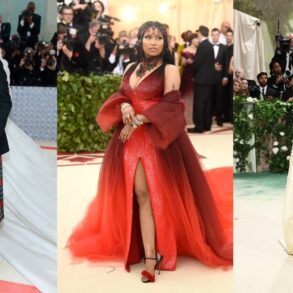Doja Cat is intent on proving to us that she’s just as much of a rapper as anyone else. And while she absolutely deserves every bit of props she gets as a rap artist, a better question is why she should be limited to any category, or excluded from any category, in the first place.
Last year, in a Drink Champs interview, Remy Ma famously said she didn’t consider Doja Cat to be a rapper. “But she makes dope records, and I think she’s dope,” Remy added. In the months since, she’s moved to clarify her statement as a compliment, but Doja has maintained that she feels “discredited” as a rapper, and that she’s using her upcoming album Scarlet to prove her detractors wrong.
First, let’s get this out the way: Doja Cat’s last two albums have loads of pop music influences, and she hasn’t run away from that. Much of the music world first heard her with “Mooo!,” and with her sweet, melodic vocals on subsequent records like “Say So,” “Streets,” and “You Right,” she’s proven herself to be a formidable, versatile pop star. But she’s been just as sharp of a rapper as any of her peers, as well. Whether on solo cuts like “Vegas” and “Rules” or alongside other spitters like Rico Nasty on “Tia Tamera” or City Girls on “Pussy Talk,” the proof is in her pen.
But for the most part, the “is this artist a rapper” conversation has been less contingent on how often an artist raps, and more about how nice they are. Ms. Lauryn Hill is widely considered the best woman MC ever, and her beloved 1998 debut album, The Miseducation of Lauryn Hill, has more soulful singing than it does rapping. Same for Drake: he’s made his fair share of R&B jams and melodic hooks, but each of his timestamp songs prove that he can rhyme. If it’s clear by your craft that rapping is not what you’re good at, you won’t get that title. But if you’re good at rapping, you’re a rapper — end of story.
For decades, hip-hop artists have refused to only be one thing. They’re rappers, producers, singers, entrepreneurs, clothing designers, visual artists, actors, directors. With that said, no one in our culture’s skills should be used to downplay another. Doja isn’t a rapper who sings, or a pop star who happens to rap. When she’s rapping, she’s a rapper. When she’s singing, she’s a singer.
Whether her mission to prove her rap skills to her detractors is a marketing ploy or an authentic gripe, seeing Doja get her bars off is a win for all of us. “Kill Bill,” “Paint The Town Red,” “Attention,” and her latest song, “Balut,” should be all the proof we need.
Do the Knowledge: While 2023 has been a strong year to pay homage to the most influential rappers in the game, one of them doesn’t get his flowers nearly enough: Project Pat, the Memphis rapper who’s been holding it down with his Three 6 Mafia family since the early ’90s. This piece by writer Lawrence Burney breaks down how the Southern titan has become an architect for modern rap, influencing the likes of King Von, Drake, Cardi B, Offset, and many more.
The Listening: Since the release of their 2019 reunion album May The Lord Watch, Little Brother has spent most of their time working on a documentary film of the same name and prepping a concert in their home state. But thankfully, they blessed fans with new music this week: a pair of loosies, “Wish Me Well” and “Glory Glory.” Over soulful beats by Deonis Pumah Cook and Conductor Williams (producer 9th Wonder is no longer in the group as of their latest album), the North Carolina duo’s chemistry is still kinetic: Phonte is spitting more of the visual, punchline-heavy bars fans know him for (“stay the fuck out the garden if you gon’ hoard the culture/horticulture ), and Rapper Big Pooh continues his case for rap’s Most Improved Player of the past five years (“standing on the shoulders of giants — Robert Horry”). This music segment of this newsletter is titled “The Listening” after Little Brother’s 2003 debut album, and the group is still proving worthy of our ears.
This post was originally published on this site be sure to check out more of their content.






